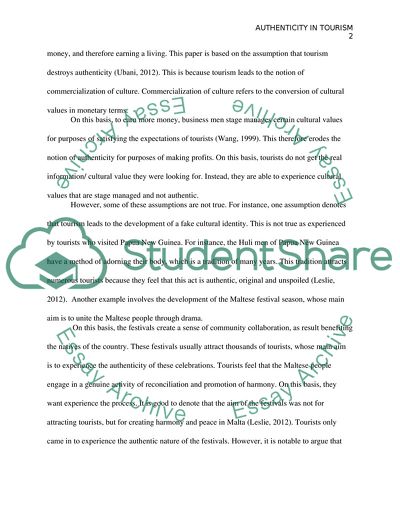Cite this document
(Authenticity in Tourism Literature review Example | Topics and Well Written Essays - 1750 words, n.d.)
Authenticity in Tourism Literature review Example | Topics and Well Written Essays - 1750 words. https://studentshare.org/tourism/1801562-does-authenticity-in-the-tourism-experience-or-the-lack-of-it-matter-discussing-using-examples-drawn-from-different-types-of-places-including-those-with-a-very-low-degree-of-authenticity
Authenticity in Tourism Literature review Example | Topics and Well Written Essays - 1750 words. https://studentshare.org/tourism/1801562-does-authenticity-in-the-tourism-experience-or-the-lack-of-it-matter-discussing-using-examples-drawn-from-different-types-of-places-including-those-with-a-very-low-degree-of-authenticity
(Authenticity in Tourism Literature Review Example | Topics and Well Written Essays - 1750 Words)
Authenticity in Tourism Literature Review Example | Topics and Well Written Essays - 1750 Words. https://studentshare.org/tourism/1801562-does-authenticity-in-the-tourism-experience-or-the-lack-of-it-matter-discussing-using-examples-drawn-from-different-types-of-places-including-those-with-a-very-low-degree-of-authenticity.
Authenticity in Tourism Literature Review Example | Topics and Well Written Essays - 1750 Words. https://studentshare.org/tourism/1801562-does-authenticity-in-the-tourism-experience-or-the-lack-of-it-matter-discussing-using-examples-drawn-from-different-types-of-places-including-those-with-a-very-low-degree-of-authenticity.
“Authenticity in Tourism Literature Review Example | Topics and Well Written Essays - 1750 Words”. https://studentshare.org/tourism/1801562-does-authenticity-in-the-tourism-experience-or-the-lack-of-it-matter-discussing-using-examples-drawn-from-different-types-of-places-including-those-with-a-very-low-degree-of-authenticity.


